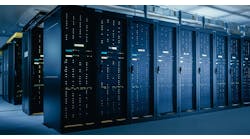A new white paper from Ameresco explores how microgrids and other solutions can improve campus sustainability and demonstrate a school’s environmental commitment.
Recent studies show that a school’s commitment to sustainability is a major factor students consider when selecting which college or university to attend. But as schools and universities contend with limited budgets, aging infrastructure and the costs of high energy consumption, they can struggle to “answer the call and take meaningful action that demonstrates credible climate commitments,” according to a new white paper from Ameresco.
To help educational institutions take significant steps forward in demonstrating their environmental commitment, the white paper outlines five tangible steps campuses can take to reduce carbon emissions, energy costs and energy usage.
One of the solutions presented is the installation of LED lighting, which can “reduce energy consumption by up to 70%,” according to the paper. The author notes that the addition of smart controls such as occupancy sensors, advanced window shades and demand-controlled dimming can further reduce energy consumption.
Ameresco explains how an energy conservation project with Baltimore City Public Schools in Maryland lowered the school district’s annual electricity costs by over $400,000. As part of the project, the district replaced existing lighting with LED lights at 15 schools.
We have the opportunity to empower the next generation of clean energy leaders. Schools are incorporating renewable energy on-site in educational settings and are integrating lessons in school curriculum. — Ameresco, “Top 5 Ways to Demonstrate Your Commitment to Sustainability“
Solar power is another option that can reduce carbon emissions, cut energy costs and improve campus sustainability. The paper notes that there are a variety of ways schools can integrate solar, including through rooftop mounted arrays, ground-mounted systems, solar carports and solar-powered benches.
The author also says that “in addition to delivering clean, renewable energy and the potential for cost savings, these solar solutions can provide shade during warm or extreme weather, and conveniences such as covered parking and community gathering spots with a perk of phone-charging capabilities.”
Energy-as-a-service agreements for energy storage and campus microgrids are another effective way to demonstrate a commitment to campus sustainability, according to Ameresco. The paper presents the case of the London (Ontario, Canada) District Catholic School Board’s use of these technologies to improve resilience and reduce annual greenhouse gas emissions.
The report also explores how electric vehicle infrastructure and clean energy curriculum can illustrate your campus’ commitment to sustainability.
Download the paper for free from the Microgrid Knowledge white paper library.









